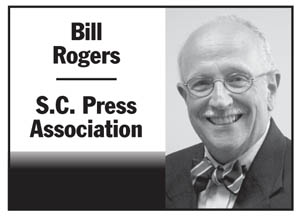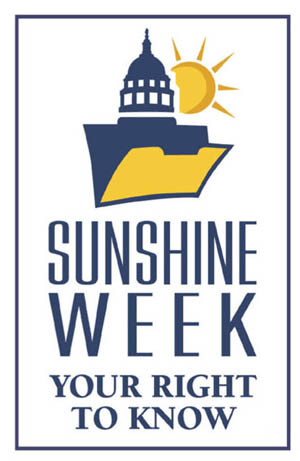Government belongs to you
Here’s a shout out to South Carolina’s 98 newspapers.
It is Sunshine Week, an annual nationwide celebration of access to public information and what it  means for you and your community. In these times when the media is increasingly accused of lying, it is appropriate to look at important stories S.C. readers would not likely have gotten recently if it weren’t for newspapers and their reporters:
means for you and your community. In these times when the media is increasingly accused of lying, it is appropriate to look at important stories S.C. readers would not likely have gotten recently if it weren’t for newspapers and their reporters:
A dogged weekly newspaper found that in Atlantic Beach general sessions court, 75 percent of the warrants were dismissed because police routinely didn’t show up for court.
Reporters at a daily newspaper exposed how sheriffs across the state lined their pockets on the public’s dime. The five-month investigation found that in the past decade, no fewer than 11 of South Carolina’s 46 counties have seen their sheriffs accused of breaking laws — nearly one in four.
A reporter combed through 7,000 pages of legal documents to find that more than 1,000 ethics complaints have been lodged against S.C. judges, including allegations of influence peddling and conflicts of interest. Zero judges were punished publicly as a result.
Two Upstate newspapers examined more than 3,200 civil forfeiture cases from across South Carolina. Their reporting showed that police are systematically seizing cash and property — many times from people who aren’t guilty of a crime — netting millions of dollars each year.
A newspaper used the Freedom of Information Act to prove long-denied allegations that a deputy sheriff had sex with a high school principal in her office and drove her around in his patrol car while on duty. The principal was removed, but got a sweetheart deal to go away.
to prove long-denied allegations that a deputy sheriff had sex with a high school principal in her office and drove her around in his patrol car while on duty. The principal was removed, but got a sweetheart deal to go away.
A county magistrate, who had been suspended from the bench, was given a year’s back pay by a county administrator without approval of county council.
There are dozens of additional Sunshine Week reporting examples from the past year.
And the battle goes on. There has been an effort in the S.C. House of Representative to close public access to business license applications. If passed, this would mean the public could not find out if an objectionable business is opening in their neighborhood. Who are they trying to protect and why?
In the preface to “A Public Officials Guide to Compliance with South Carolina’s Freedom of Information Act,” Attorney General Alan Wilson recommends that, when in doubt, public bodies should disclose public records, announce meetings correctly and keep meetings open to the public.
In reality, public bodies are more likely to listen to their constituents about government transparency.
So stand up and be heard when you see a problem.
Not just for Sunshine Week, but for every week of the year. Government belongs to you.
Bill Rogers is executive director of the S.C. Press Association, which represents the state’s 15 daily and 83 weekly newspapers. The Press Association has been defending the public’s right to know since 1852.



























